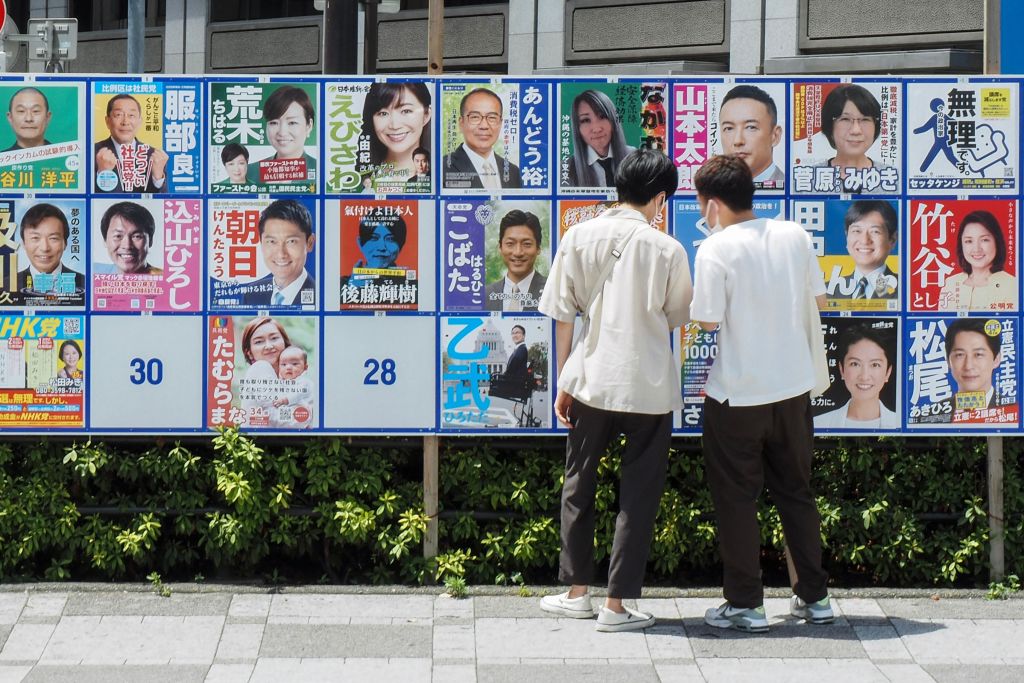The party of former Japanese Prime Minister Shinzo Abe–who was gunned down on July 8–swept to victory in parliamentary elections just two days after his killing sent shockwaves through Japan.
The conservative Liberal Democratic Party (LDP) secured 63 of the 125 seats up for grabs. The LDP and its coalition partner, the Komeito, won 76 seats—retaining a comfortable majority in the upper house of parliament.
Read More: Shinzo Abe Rewrote Japan’s Place in the World. And Remained a Power Broker Until the Very End
It’s a slight boost for the ruling LDP, which held 55 seats before the election, but it was hardly a mass outpouring of public support.
“The ruling LDP coalition was already going into the election in a strong position,” says Michael Green, CEO of the U.S. Studies Centre in Australia and author of Line of Advantage: Japan’s Grand Strategy in the Era of Abe Shinzo. “Prime Minister [Fumio] Kishida learned from the mistakes of his immediate predecessor regarding the politics of COVID and regained public confidence for the government. The opposition parties, meanwhile, are divided and disorganized.”
The LDP has held power for all but a few years since its formation in 1955. Even before Abe’s killing, opinion polls showed the ruling bloc in the lead in the election for seats in the parliament’s less powerful upper house. A Nikkei Research poll of more than 60,000 people done in early July showed the LDP was projected to win about 60 of the 125 seats. The turnout of about 52% was just slightly higher than the last upper-house elections three years ago, which saw about 49% voter turnout.
The slightly higher voter turnout followed appeals from politicians—many of whom campaigned under tight security on Saturday in a final push to win voters—to not allow Abe’s murder impact their voting. “We must never allow violence to suppress speech during elections, which are the foundation of democracy,” Kishida said on Saturday.
Read more: Looking Back at TIME’s Coverage of Shinzo Abe: ‘I Am a Patriot.’
Abe, who served two stints as prime minister from 2006 to 2007 and from 2012 to 2020, was shot twice on Friday morning while giving a speech in the city of Nara in western Japan, while campaigning for the LDP ahead of Sunday’s legislative elections. Despite his resignation due to ill health in 2020, he was still perhaps the most influential politician in the country. He led the largest faction in the LDP and played an important role in setting the party’s agenda and its leadership.

Still, the election—typically seen as a referendum on the incumbent government—may help Kishida consolidate his rule. Christopher Johnstone, the Japan chair at the Washington-based Center for Strategic and International Studies (CSIS) think tank, says that Kishida’s “immediate challenge will be addressing the economy, and inflation in particular, which polls indicated was the top issue for voters.” Kishida has promised to revitalize Japan’s economy with a “new form of Japanese capitalism.”
The vote might also pave the way for Kishida to revise the country’s pacifist constitution—a lifelong goal for Abe. The U.S.-drafted-constitution, which renounces war, was imposed on Japan after World War II.
Read more: How the World Is Reacting to Shinzo Abe’s Death
The outcome of Sunday’s vote means political forces supportive of constitutional revision retain a two-thirds majority of the upper chamber. Still, a revision to the constitution would have to pass a national referendum, in a country where Abe’s push for increased militarization has in the past led to large street protests.
Johnstone says Kishida “has an aggressive defense agenda, including increased spending and acquiring new capabilities like long-range strike [weapons]…Public opinion polls indicate support for this defense agenda. I expect it will move.”
Kishida said on Sunday that he would push forward with plans to amend the constitution. The ruling coalition “will deepen parliamentary debate over the constitution further so a concrete amendment proposal can be compiled,” he said.
More Must-Reads From TIME
- The 100 Most Influential People of 2024
- The Revolution of Yulia Navalnaya
- 6 Compliments That Land Every Time
- What's the Deal With the Bitcoin Halving?
- If You're Dating Right Now , You're Brave: Column
- The AI That Could Heal a Divided Internet
- Fallout Is a Brilliant Model for the Future of Video Game Adaptations
- Want Weekly Recs on What to Watch, Read, and More? Sign Up for Worth Your Time
Write to Amy Gunia at amy.gunia@time.com